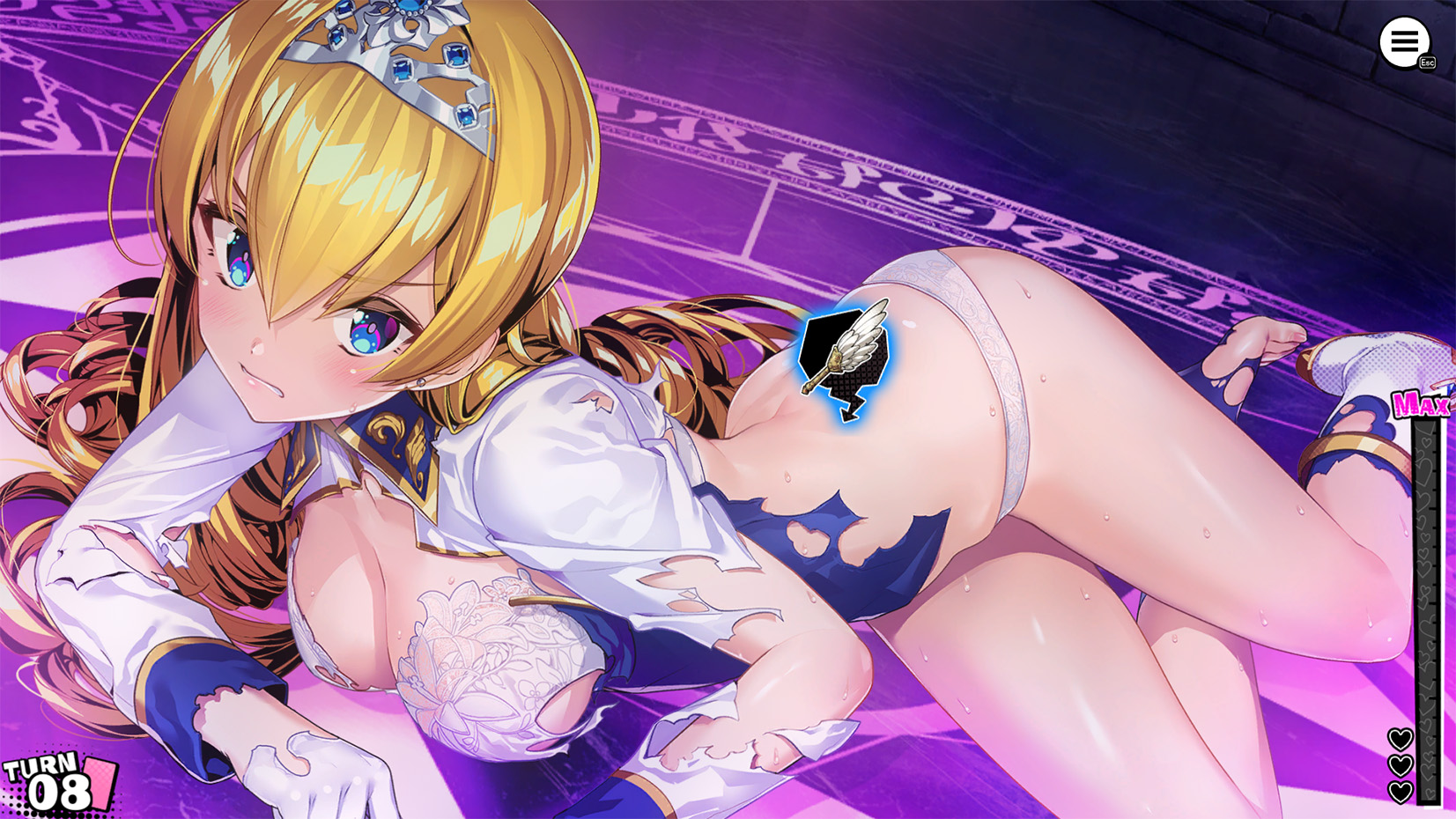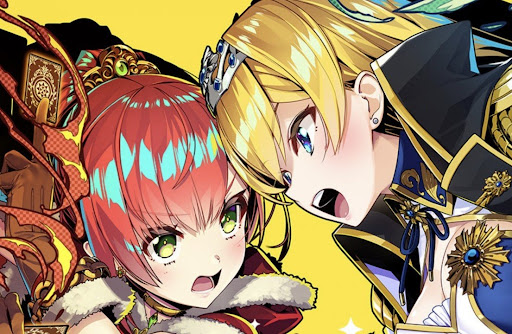Imagine my relief when there wasn’t anywhere near enough fan service in the part that I streamed to get the YouTube algorithms involved. There was some ripping clothes and panty flashes, sure, but nothing too extreme. I played for about an hour, lost a couple of times without beating a boss, and then went offline to continue playing for this review. My relief was doubled by the fact that, about 10 minutes after cutting the stream, I did defeat the first boss and was treated to a “punishment” scene which is… well, it’s out there. Very, very out there. YouTube would have most definately objected to that.
But to reverse a bit before we get to the discussion about fan service, which will dominate discussion about this game. Duel Princess is a light strategy game, in which most of your time will be spent summoning characters to a 2D battlefield, where they will automatically make their way over to the opponent’s base. They’ll attack any enemies they encounter along the way, or the base directly if there are no enemies left on the field. The first one to destroy an opponent’s base is the winner. It’s exactly the same kind of play as the endlessly entertaining Battle Cats, with the one exception being that while you’ll have access to all your units at all times in Battle Cats, in Duel Princess there’s a card-based system in play, where you can only summon units from your hand, with new cards being drawn as you summon existing units to the field of battle. You can only have up to 20 cards in this deck, so there are some deck building strategies that you’ll need to apply between battles, and that’s a nice build on to the basic Battle Cats formula, though it’s by no means the most complex deck builder you’ve ever come across.
Campaigns take place over a number of smaller battles in the leadup to the boss, which is just a more difficult version of those smaller skirmishes. It’s when you beat the boss that things go wild and the fan service kicks in. She’ll join your army (as the narrative goes), but first, for reasons the game never bothers to properly explain, she needs to be “punished”. This takes the form of a little minigame, where the boss is stripped down to her underwear and pinned down. Your job is to kink-torture her with ice cubes, skin rollers, feathers and tickles. Hit the spots she likes and she’ll respond better to you.
Why are you ravishing her and how does doing so benefit your military cause? I’m still not sure. These scenes exist for no reason beyond eroticism. They add nothing to the broader gameplay, and the story barely bothers to say anything beyond “punishment time!” (and that’s probably just as well, since if they did try to explain it would start to be uncomfortably close to a reflection on what generally happens when one army conquers another, and that’s anything but the playful good time that Duel Princess presents). Despite having no reason to exist, however, they’re in there and they’re unavoidable, and the presence of these scenes will tell you whether Duel Princess is for you or not. If you do enjoy these things, then Duel Princess does do a particularly good job of it. Each of the game’s characters is drawn to be brilliantly attractive, and in the punishment scenes, they not only look great, but also writhe and moan in a way that I never thought I’d see on the console before. Kudos to Nintendo for being open to this stuff on the Switch. However, the developer has deliberately and deceptively hidden this material from promos, so I’ve included an example in this review so you know what is actually involved in playing Duel Princess. Outside of these scenes Duel Princess is really just a nicely drawn and lightly fanservicesy casual strategy game, so I’m really quite annoyed at the deception. I’d hate for people to go in expecting one thing and get hit by these out of nowhere.
The plot itself isn’t anything to write home about, and that’s par for the course with qureate. The strategy stuff is simple, but it’s also enjoyable and just tactical enough that you’ll need a good sense of timing (when to summon particular units), and planning. One of the things you can do is combine cards of the same type to power them up, but since you can only have four cards in the hand, you need to manage your deck really well to maximise the chances that you’ll end up with multiples in the hand at any one time. Outside of battle, there are shops that can use to buy or dump cards to manipulate the deck, and then there’s the option to fight difficult “elite” battles to get access to more powerful cards. You’ll want to be careful about that, though, because there’s also roguelike permadeath, so that if you make a mistake it’s back to the start of the chapter for you. When you consider how well all of that comes together, and just how well it plays as a roguelike casual strategy game, you realise that Duel Princess doesn’t really benefit from the erotic content, it doesn’t add anything to the game, and it’s going to actively put some people off playing it. It’s certainly nice to look at – these princesses really are pretty and the artist that drew these scenes is absolutely amazing at their job, but it’s hard not to wish that there was some kind of outcome to the eroticism that makes it more integral to everything else in the game. All it needed was an actual reason and I would have been on board with it in its entirety.
Like all of qureate’s games, the fan service of Duel Princess crosses far beyond the light and bubbly stuff that sits within a lot of people’s comfort zones and lands squarely into outright titillation. Those who tolerate fan service if they otherwise enjoy a game will find this a bit much, and as a consequence qureate has certainly limited the audience more than the team needed to, given how little relevance the erotic elements have to anything else in the game. However, for people like me that do enjoy the aesthetics of anime eroticism, there’s the added benefit with Duel Princess that it’s qureate’s best game to date. By moving the focus far away from storytelling (which they’re terrible at), to casual and entertaining gameplay structures (which, as it turns out, they’re quite good at), qureate is getting dangerously close to giving the likes of Idea Factory a run for their money.










